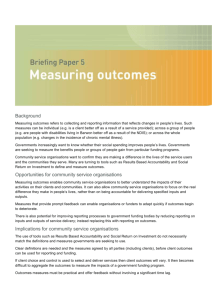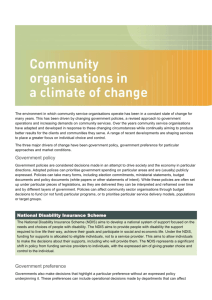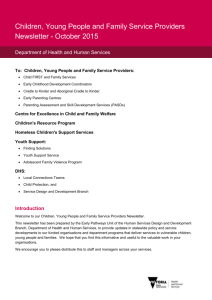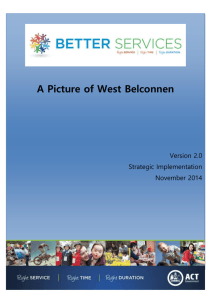Key Messages - ACT Council of Social Service
advertisement
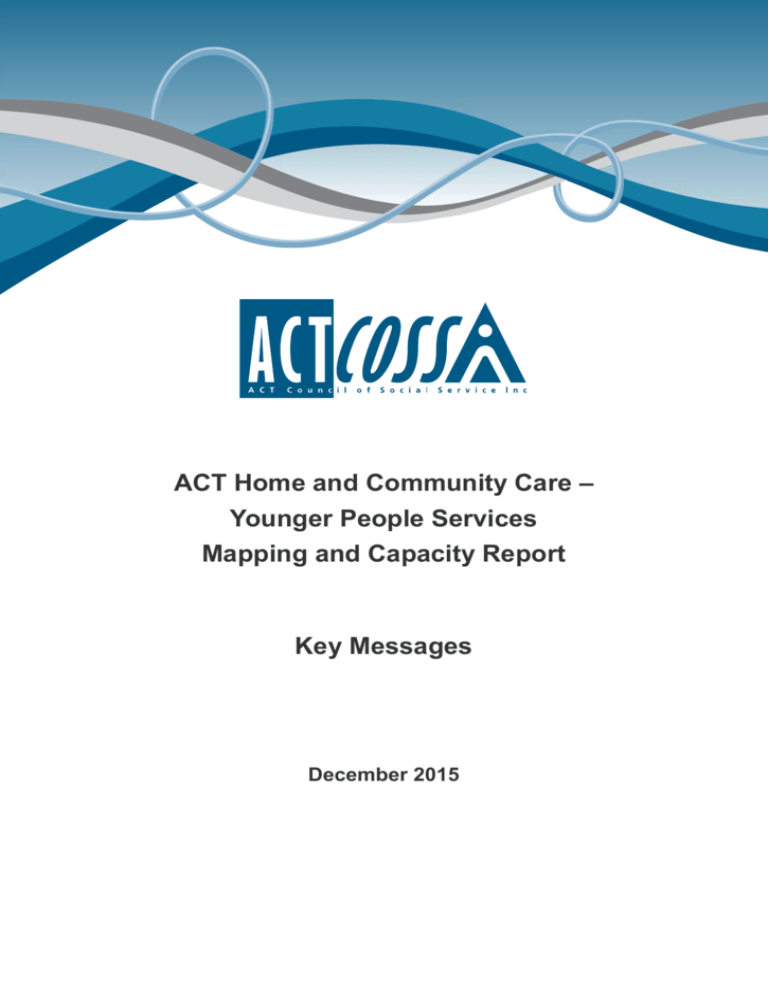
ACT Home and Community Care – Younger People Services Mapping and Capacity Report Key Messages December 2015 Introduction ACT Home and Community Care-Younger People (HACC-YP) Services for people with an ongoing disability under 65 years, have had capacity issues for over 18 months, with many people not able to access a service they need. This project aimed to map the existing ACT HACC-YP Service System and assess capacity and unmet need. This is in the context of the ACT HACC-YP Program undergoing a review, with current contracts ending June 2016. Two surveys were developed, collated and analysed: ‘The ACT HACC-YP Unmet Need Survey’ and ‘The ACT HACC-YP Organisation Survey’ The results of these surveys are summarised below. Features of the Existing ACT HACC-YP Service System 24 organisations receive HACC-YP Funding for people with disability under 65 years. They are funded across 16 service types. Social Support, Personal Care, Case Management and Domestic Assistance have the highest number of organisations funded to provide them. Allied Health, Home Modifications, Linen Services, Meals and Nursing have only one provider. The majority of the 24 organisations were funded for five or less service types, with less than a third funded for a larger number of service types. The regions with the greatest proportion of services delivering in that region are the Inner North, Gungahlin and Belconnen. The majority of HACC-YP Services cover the whole ACT, with nearly a third covering a more specific region. Unmet Need and Capacity Issues During the Unmet Need Survey’s four week snapshot period, 30 people were identified as not able to access HACC-YP Services due to lack of places. For these 30 people: The service types they most needed were Domestic Assistance, Counselling/Support Information and Advocacy, Social Support, Case Management and Personal Care The highest numbers were living in Belconnen and the Inner South 45 percent had been referred to multiple organisations for the same need. 2 From the Organisation Survey we found the following issues: A number of service types were identified as providing services significantly above their funded outputs, including Goods and Equipment, Transport, Personal Care and Social Support. HACC-YP Services were able to accept low and decreasing numbers of new clients last financial year. Five of the service types could accept less than an average of 5 new clients per service during the first six months, and most service types, accepted even fewer new clients during the second six months. Other evidence of unmet need organisations identified, include waiting lists with little movement off these. This research provides credible evidence that the HACC-YP Service System has not only had very limited capacity to accept new clients, but that some services are currently providing many more outputs than what funding covers. These additional services are not sustainable, as they rely on using surpluses accrued over previous years, and non-government funds that are not secure (For example, donations). For the majority of those not eligible for the NDIS and not currently receiving a HACC-YP Service, it is highly unlikely that they will access the services that they need and are entitled to without an increase in resources into the service system. Impacts on People with Disability There are significant impacts for those not able to access needed supports. These include deteriorating physical health, mental health and wellbeing; social isolation; insecure and inappropriate housing; and deteriorating carer health and wellbeing. People with an ongoing disability are still part of the target group for HACC-YP until 30th June 2016. From July 2016, the NDIS will be responsible for funding supports for people with an ongoing disability. However, until then, the ACT Government will be bearing the costs for people who cannot access appropriate community care, including much higher costs through the health system. Costs through the health system include avoidable hospital admissions and longer hospital stays. Impacts of Capacity Issues on Service Providers Services shared a range of strategies being used to deal with capacity issues. These include utilising other sources of funding, workforce changes/restructure, increasing client fees/costs, prioritising access and changing/restructuring service operations. (Please see over the page for Recommendations) 3 Recommendation for Immediate Action 1. Prior to the new ACT HACC-YP Program starting in July 2016, access should be provided to one-off individual HACC-YP funding for clients who cannot access HACC-YP Services due to lack of places. This needs to be flexible to providing whatever support type is needed and should be available to people who are not/will not be eligible for the NDIS. Recommendations for the New HACC-YP Program from July 2016 2. Continue to fund services for the whole ACT, rather than for specific regions, to enable choice of providers and the ability to respond to demand for service without being limited by where the person lives 3. Fund flexible services that are able to respond to individual need, rather than being funded for a particular service type. 4. Fund specialist service types in organisations with proven trust in and specialist capability to engage and meet needs: for people with dementia, people of Aboriginal and Torres Strait Islander Background and people of Culturally and Linguistically Diverse background. 5. Fund specialist service types for those which require proven specialist skills, like advocacy and service types where there is currently only one provider like Nursing and Meals. 6. Clearly articulated eligibility criteria, including priority access criteria to ensure that support is provided to those who most need it with a much smaller funding pool. 7. Processes to streamline allocation of referrals, so that clients don’t need to make multiple referrals, and to ensure a fair allocation of scarce resources. 8. Appropriate support and transition processes for organisations who don’t continue to receive HACC-YP funding post July 2016, and adequate support and continuity of care for clients who will need to change providers. 9. The future procurement of HACC-YP services should: Prioritise continuity of care relationships Minimise disruption by building on existing capacity Improve choice and control Include resourcing for workforce capability development Be planned in a coordinated way with procurement and development of other related and intersecting services including: mental health care, social and community participation programs, palliative care, carer support, chronic health care management, hospital models of care, and pre-post admission planning and transport. 4


